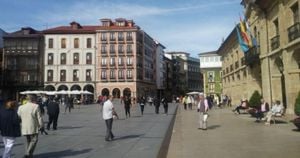Scared to stay and afraid of what’s to come, migrants fleeing violence and poverty increasingly find themselves stuck not just at the U.S.-Mexico border but within Mexico. Many view former President Donald Trump’s return to the political arena as even more perilous than the hostile conditions they face now. Trump’s crackdowns on immigration loom over them like dark clouds, prompting some to reconsider their plans and even return home.
Reports out of Tapachula, southern Mexico, reveal stories of migrants who have been waiting months for their chance to request asylum, many of whom are deeply concerned about what might happen if Trump, who has been vocal about his plans to reinstate severe immigration policies, regains power. According to Tito, who left Haiti and arrived in Tapachula hoping to make his way to the U.S., the stakes have never been higher. He stated, "It hurts me to see these people with their children. I couldn’t bear to have my kid do this with me." His sentiment reflects the desperation and uncertainty shared by many trapped within the restrictive migration system.
Tapachula, situated near the Guatemala border, has transformed over the years. Once merely a pit stop for many migrants, it is now seen as more of a bottleneck, thanks largely to Mexico's efforts to curb the migratory surge, influenced heavily by U.S. foreign policy. Here, the conditions are challenging not only due to insufficient infrastructure but also because migrants find themselves at the mercy of human smugglers and exploitative business practices.
Reports indicate there are roughly 50,000 migrants floating around Tapachula, according to local human rights organizations, waiting for appointments through the U.S. Customs and Border Protection's digital system, the CBP-One app. While Mexico has been accommodating requests for asylum, the bureaucratic overlay can be disheartening. Many migrants who arrive without pre-scheduled appointments risk being detained and sent back to Tapachula.
The gravity of their situation is compounded by their desperation for any form of work; some, like Tito, describe informal jobs at ridiculously low wages, sometimes less than 250 pesos—equivalent to about ten dollars—after long hours of labor. “The truth is there is not the capacity to attend to everyone,” explained América Pérez from the Jesuit Refugee Service. Most shelters are filled to capacity, and those who can’t find room resort to tents or even living under the open sky.
Trump's past calls for tougher policies, often described as draconian, hang heavily over the would-be migrants. For those who feel unsafe staying put, returning to their home countries is becoming increasingly tempting. For many, such as families facing clear dangers from gang violence, the prospect of going back seems utterly hopeless but may be the only viable option left on the table.
Local politicians have noted the impact of these fears and policies. Many migrants are witnessing the proud children they carried through treacherous journeys facing uncertainty and deprivation, echoing the reality faced by countless families across the border. Tapachula is now effectively operating as the U.S.'s biological block—being molded and enforced by Mexican authorities, aimed at meeting the expectations of U.S. immigration mandates.
“Every time Trump speaks, it sends shivers down my spine,” expressed one migrant. It’s not just about improving life for themselves; it’s about maintaining their family togetherness at all costs, all under the shadow of returning to potentially harmful situations they once fled.
The interconnected issues here paint the picture of people caught between two paths: one of hope, representing the dream of reaching the U.S., and another representing danger and suffering at home. According to the latest reports, amid the anxiety about Trump's looming political leverage, everyone—migrants, advocates, and politicians alike—wait anxiously, not just for their fate, but also for the policies surrounding migration as the new presidential election approaches.
With mounting fears surrounding Trump's future decisions, only time will tell if those like Tito and others trapped within the socio-political whirlwind will find respite or face more obstacles at the perilous crossroads of migration.



